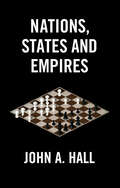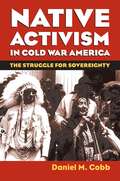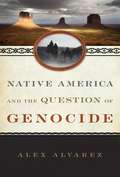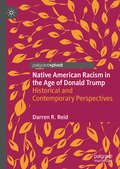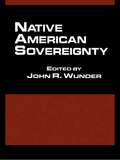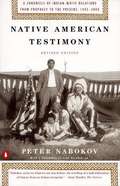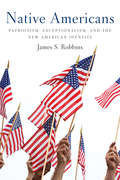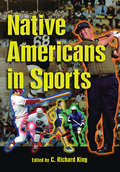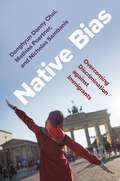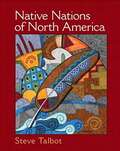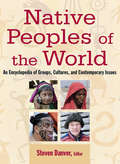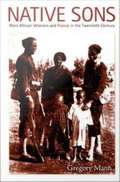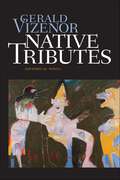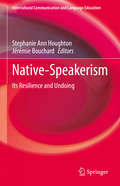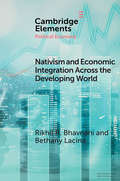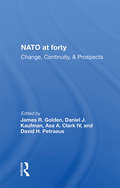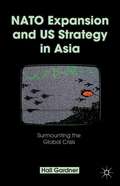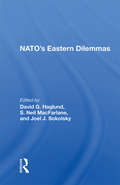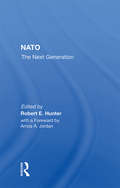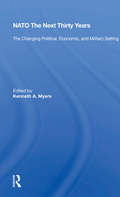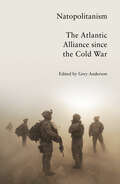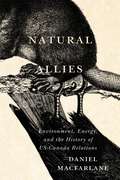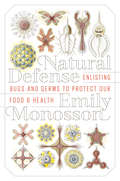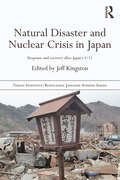- Table View
- List View
Nations, States and Empires
by John A. HallThis book traces the interactions between nations, states and empires in the making of the modern world. It is commonly assumed that nation states succeeded and replaced empires, relegating empires to the past: Hall argues that this is not the case. Empires have continued alongside nation states, shadowing them and overseeing them in the industrial era. The two world wars were imperial wars, rather than wars between nation states. Even after rapid decolonization in the 1950s and 1960s, empires persisted in the USA and the USSR. Furthermore, empires are not finished: the USA retains enormous power whilst Russia and China increasingly show imperial dispositions. Furthermore, empires and nation states do not exist in separate compartments— rather, they often overlap. Consider the USA—at once highly nationalist and the greatest empire in the history of the world. This highly original book will be essential reading for students and scholars in sociology and politics and for anyone interested in the political forces that have shaped, and continue to shape, the modern world.
Native Activism In Cold War America: The Struggle for Sovereignty
by Daniel M. CobbThe heyday of American Indian activism is generally seen as bracketed by the occupation of Alcatraz in 1969 and the Longest Walk in 1978; yet Native Americans had long struggled against federal policies that threatened to undermine tribal sovereignty and self-determination. This is the first book-length study of American Indian political activism during its seminal years, focusing on the movement's largely neglected early efforts before Alcatraz or Wounded Knee captured national attention.
Native America and the Question of Genocide
by Alex AlvarezDid Native Americans suffer genocide? The book explores the destructive beliefs of the European settlers and then looks at topics including disease, war, and education through the lens of genocide.
Native American Racism in the Age of Donald Trump: Historical and Contemporary Perspectives
by Darren R. ReidThis book examines the resurgence of anti-Native Americanism since the start of Donald Trump’s bid for the US Presidency. From the time Trump announced his intention to run for president, racism directed towards Native Americans has become an increasingly visible part of cultural and political life in the United States. From the completion of the Dakota Access Pipeline to the controversies surrounding Elizabeth Warren’s identity, to open mockery by teenagers wearing MAGA hats, anti-Native Americanism is now at its most visible in the United States since the early twentieth century. This volume places this resurgent anti-Native Americanism into an appropriate contemporary context by demonstrating how historical forces have created the foundation upon which many of these controversies are built. Chapters examine three key processes in US history and how they have shaped today’s political climate: violence as a force of attitudinal change; the root issues at the heart of Native American identity politics; and the dismissal of modern Native American inequalities through a prolonged European American fascination with the imagery of the noble savage.
Native American Sovereignty: Contemporary And Historical Perspectives On American Indian Rights, Freedoms And Sovereignty (Native Americans And The Law Ser. #Vol. 6)
by John R. WunderFirst published in 2000. Routledge is an imprint of Taylor & Francis, an informa company.
Native American Testimony: A Chronicle of Indian-White Relations from Prophecy To The Present, 1492-2000 (Updated Edition)
by Peter NabokovIn a series of powerful and moving documents, anthropologist Peter Nabokov presents a history of Native American and white relations as seen though Indian eyes and told through Indian voices. Beginning with the Indians' first encounters with European explorers, traders, missionaries, settlers, and soldiers to the challenges confronting Native American culture today, Native American Testimony spans five hundred years of interchange between the two peoples. Drawing from a wide range of sources--traditional narratives, Indian autobiographies, government transcripts, firsthand interviews, and more--Nabokov has assembled a remarkably rich and vivid collection, representing nothing less than an alternate history of North America.
Native Americans
by James S RobbinsAre you an American? According to the U.S. Census Bureau, increasing numbers of people are claiming "American" as their national ancestry. In our melting pot of cultures, they are taking a stand as authentic representatives of the American nation. This growing social phenomenon serves as the launching point for a discussion of what twenty-first century Americanism means-its roots and its significance-and the unrelenting assault from multiculturalists who believe that the term "American" either signifies nothing or is a badge of shame. Author James S. Robbins describes the foundations of the American ideal, the core set of beliefs that define American values, and the ways in which these standards have been undermined and corrupted. He also makes the case for the benefits of an objective standard of what it means to be an American and for returning to the values that turned America from an undeveloped wilderness to the most exceptional country in the world.
Native Americans in Sports: African Americans In Sports
by C. Richard KingOffers full coverage of Native American athletes and athletics from historical, cultual and indigenous perspectives, from before European intervention to the 21st century. There are entries devoted to broader cultural themes, and how these affect and are affected by the sport.
Native Bias: Overcoming Discrimination against Immigrants (Princeton Studies in Political Behavior #35)
by Nicholas Sambanis Donghyun Danny Choi Mathias PoertnerWhat drives anti-immigrant bias—and how it can be mitigatedIn the aftermath of the refugee crisis caused by conflicts in the Middle East and an increase in migration to Europe, European nations have witnessed a surge in discrimination targeted at immigrant minorities. To quell these conflicts, some governments have resorted to the adoption of coercive assimilation policies aimed at erasing differences between natives and immigrants. Are these policies the best method for reducing hostilities? Native Bias challenges the premise of such regulations by making the case for a civic integration model, based on shared social ideas defining the concept and practice of citizenship.Drawing from original surveys, survey experiments, and novel field experiments, Donghyun Danny Choi, Mathias Poertner, and Nicholas Sambanis show that although prejudice against immigrants is often driven by differences in traits such as appearance and religious practice, the suppression of such differences does not constitute the only path to integration. Instead, the authors demonstrate that similarities in ideas and value systems can serve as the foundation for a common identity, based on a shared concept of citizenship, overcoming the perceived social distance between natives and immigrants.Addressing one of the most pressing challenges of our time, Native Bias offers an original framework for understanding anti-immigrant discrimination and the processes through which it can be overcome.
Native Nations Of North America: An Indigenous Perspective
by Steve TalbotExamines Native Americans’ struggles for indigenous rights Native Nations of North America: An Indigenous Perspective, 1/e, establishes a foundation of knowledge by examining the history of selected North American Natives from their perspective. By exploring the past, readers will better understand the struggles of modern-day indigenous peoples. Author Steven Talbot addresses many of the struggles and achievements for indigenous rights, including the goals of treaty rights, nationhood, and sovereignty.
Native Peoples of the World: An Encyclopedia of Groups, Cultures and Contemporary Issues
by Steven L. DanverThis work examines the world's indigenous peoples, their cultures, the countries in which they reside, and the issues that impact these groups.
Native Sons: West African Veterans and France in the Twentieth Century
by Gregory MannFor much of the twentieth century, France recruited colonial subjects from sub-Saharan Africa to serve in its military, sending West African soldiers to fight its battles in Europe, Southeast Asia, and North Africa. In this exemplary contribution to the "new imperial history," Gregory Mann argues that this shared military experience between France and Africa was fundamental not only to their colonial relationship but also to the reconfiguration of that relationship in the postcolonial era. Mann explains that in the early twenty-first century, among Africans in France and Africa, and particularly in Mali--where Mann conducted his research--the belief that France has not adequately recognized and compensated the African veterans of its wars is widely held and frequently invoked. It continues to animate the political relationship between France and Africa, especially debates about African immigration to France. Focusing on the period between World War I and 1968, Mann draws on archival research and extensive interviews with surviving Malian veterans of French wars to explore the experiences of the African soldiers. He describes the effects their long absences and infrequent homecomings had on these men and their communities, he considers the veterans' status within contemporary Malian society, and he examines their efforts to claim recognition and pensions from France. Mann contends that Mali is as much a postslavery society as it is a postcolonial one, and that specific ideas about reciprocity, mutual obligation, and uneven exchange that had developed during the era of slavery remain influential today, informing Malians' conviction that France owes them a "blood debt" for the military service of African soldiers in French wars.
Native Tributes: Historical Novel
by Gerald VizenorNative Tributes is a sequel to Blue Ravens by Gerald Vizenor, a historical novel about Native Americans in the First World War published by Wesleyan University Press in 2014. Basile Hudon Beaulieu, a native writer, his brother Aloysius, an abstract artist, travel by train from the White Earth Reservation in Minnesota to Washington, D.C. where they protest with thousands of other military veterans in the Bonus Army, and their cousin By Now Rose Beaulieu, a veteran nurse, rides her horse named Treaty to the same march during the summer of 1932. Aloysius creates hand puppets and entertains the spirited veterans with the mockery of communists and President Herbert Hoover. General Douglas McArthur routes the veterans from the National Mall, and the Beaulieu brothers move to an encampment of needy veterans in Hard Luck Town on the East River in New York City. The brothers visit the Biblo and Tanner Booksellers, a gallery owned by Alfred Stieglitz, the Modicut Puppet Theatre, and an exhibition at the Museum of Modern Art. Aloysius is inspired by Arthur Dove, Chaïm Soutine, and Marc Chagall. Native Tributes is a journey of liberty, and escapes the enticement of nostalgia and victimry. Vizenor maintains his masterly perception of oral stories, and creates a dynamic literary tribute to Native American veterans and visionary artists in the Great Depression.
Native-Speakerism: Its Resilience and Undoing (Intercultural Communication and Language Education)
by Stephanie Ann Houghton Jérémie BouchardThis book explores native-speakerism in modern language teaching, and examines the ways in which it has been both resilient and critiqued. It provides a range of conceptual tools to situate ideological discourses and processes within educational contexts. In turn, it discusses the interdiscursive nature of ideologies and the complex ways in which ideologies influence objective and material realities, including hiring practices and, more broadly speaking, unequal distributions of power and resources. In closing, it considers why the diffusion and consumption of ideological discourses seem to persist, despite ongoing critical engagement by researchers and practitioners, and proposes alternative paradigms aimed at overcoming the problems posed by the native-speaker model in foreign language education.
Natives against Nativism: Antiracism and Indigenous Critique in Postcolonial France (Muslim International)
by Olivia C. HarrisonExamining the intersection of Palestine solidarity movements and antiracist activism in France from the 1970s to the present For the pasty fifty years, the Palestinian question has served as a rallying cry in the struggle for migrant rights in postcolonial France, from the immigrant labor associations of the 1970s and Beur movements of the 1980s to the militant decolonial groups of the 2000s. In Natives against Nativism, Olivia C. Harrison explores the intersection of anticolonial solidarity and antiracist activism from the 1970s to the present.Natives against Nativism analyzes a wide range of texts—novels, memoirs, plays, films, and militant archives—that mobilize the twin figures of the Palestinian and the American Indian in a crossed critique of Eurocolonial modernity. Harrison argues that anticolonial solidarity with Palestinians and Indigenous Americans has been instrumental in developing a sophisticated critique of racism across imperial formations—in this case, France, the United States, and Israel.Serving as the first relational study of antiracism in France, Natives against Nativism observes how claims to indigeneity have been deployed in multiple directions, both in the ongoing struggle for migrant rights and racial justice, and in white nativist claims in France today.
Nativism and Economic Integration Across the Developing World: Collision and Accommodation (Elements in Political Economy)
by Rikhil R. Bhavnani Bethany LacinaMigration and nativism are explosive issues in Europe and North America. Less well-known is the tumult that soaring migration is creating in the politics of developing countries. The key difference between anti-migrant politics in developed and developing countries is that domestic migration - not international migration - is the likely focus of nativist politics in poorer countries. Nativists take up the cause of sub-national groups, vilifying other regions and groups within the country as sources of migration. Since the 1970s, the majority of less-developed countries have adopted policies that aim to limit internal migration. This Element marshals evidence from around the world to explore the colliding trends of internal migration and nativism. Subnational migration is associated with a boom in nativist politics. Pro-native public policy and anti-migrant riots are both more likely when internal migration surges. Political decentralization strengthens subnational politicians' incentives and ability to define and cater to nativists.
Nato At Forty: Change, Continuity, And Prospects
by David H. Petraeus James R. Golden Daniel J. Kaufman Asa A. Clark IVThis book addresses the evolving role of North Atlantic Treaty Organization (NATO). It seeks to answer whether NATO is capable of adjusting to changes in the forces that have held it together and have made it the centerpiece of the national security strategies of its members.
Nato Expansion And Us Strategy In Asia
by Hall GardnerSurmounting the Global Crisis critiques the impact of NATO enlargement and the US 'pivot to Asia' on both the Russia and China and examines how these dual US-backed policies may influence key countries in the Euro-Atlantic, wider Middle East, and Indo-Pacific regions in general.
Nato's Eastern Dilemmas
by Joel J. Sokolsky David G. Haglund S. Neil MacFarlaneThe contributors to this book set out to show that NATO's post-Cold War troubles are largely self-generated and almost exclusively "eastern". They focus in particular on the issue of what to do with the former Yugoslavia.
Nato--the Next Generation: Reboot Or Delete?
by Robert E. Hunter Amos A. JordanThe survival of NATO as a viable alliance is currently challenged by a shift in the strategic balance of power, as well as by global events and contingencies that extend far beyond NATO's boundaries. In the face of these challenges, existing institutional mechanisms are proving inadequate to respond effectively. The distinguished contributors to this volume draw on their vast political and diplomatic experience to identify and analyze the problems confronting NATO for the remainder of the twentieth century. They make clear the need for a trans-Atlantic communication network among policymakers, scholars, and others–a network that will allow an ongoing process of analysis and assessment of NATO's strategic, economic, and political problems, along with the identification of appropriate reactions.
Nato--the Next Thirty Years: The Changing Political, Economic, And Military Setting
by Kenneth A. MyersThe survival of NATO as a viable alliance is currently challenged by a shift in the strategic balance of power, as well as by global events and contingencies that extend far beyond NATO's boundaries. In the face of these challenges, existing institutional mechanisms are proving inadequate to respond effectively. The distinguished contributors to this volume draw on their vast political and diplomatic experience to identify and analyze the problems confronting NATO for the remainder of the twentieth century. They make clear the need for a trans-Atlantic communication network among policymakers, scholars, and others-a network that will allow an ongoing process of analysis and assessment of NATO's strategic, economic, and political problems, along with the identification of appropriate reactions.
Natopolitanism: The Atlantic Alliance since the Cold War
by Grey AndersonDid NATO cause the crisis in Ukraine?Following the Russian invasion of Ukraine, the fortunes of NATO—pronounced &“braindead&” only a few years prior—have been miraculously revived. The alliance, buoyed by surging European military budgets and inflows of combat-ready troops and cutting-edge hardware, looks forward to welcoming additional member states. Originally conceived as a bulwark against the Soviet Union, NATO has outlasted its ostensible foe by over three decades. Its geostrategic remit is limited to the North Atlantic in name only. Treaty obligations range from the Andes to the Gulf of Aden and the Khyber Pass, and allied commanders now prepare for battle in the South China Sea. Natopolitanism takes an in-depth look at the evolution and aggrandizement of NATO since the turn of the 1990s. What purposes does NATO serve in the post-Cold War world? What is the balance sheet of a quarter century of alliance expansion, and what part did it play in the eruption of conflict on Europe&’s eastern marches? Contributors to the volume, including John J. Mearsheimer, Mary Elise Sarotte, Susan Watkins, Wolfgang Streeck, and Volodymyr Ishchenko, revisit this this history as it unfolded. Varying in viewpoint and judgment, all share a critical perspective at odds with wartime pieties.
Natural Allies: Environment, Energy, and the History of US-Canada Relations (McGill-Queen's/Brian Mulroney Institute of Government Studies in Leadership, Public Policy, and Governance #14)
by Daniel MacfarlaneNo two nations have exchanged natural resources, produced transborder environmental agreements, or cooperatively altered ecosystems on the same scale as Canada and the United States. Environmental and energy diplomacy have profoundly shaped both countries’ economies, politics, and landscapes for over 150 years.Natural Allies looks at the history of US-Canada relations through an environmental lens. From fisheries in the late nineteenth century to oil pipelines in the twenty-first century, Daniel Macfarlane recounts the scores of transborder environmental and energy arrangements made between the two nations. Many became global precedents that influenced international environmental law, governance, and politics, including the Boundary Waters Treaty, the Trail Smelter case, hydroelectric megaprojects, and the Great Lakes Water Quality Agreements. In addition to water, fish, wood, minerals, and myriad other resources, Natural Allies details the history of the continental energy relationship – from electricity to uranium to fossil fuels –showing how Canada became vital to American strategic interests and, along with the United States, a major international energy power and petro-state. Environmental and energy relations facilitated the integration and prosperity of Canada and the United States but also made these countries responsible for the current climate crisis and other unsustainable forms of ecological degradation. Looking to the future, Natural Allies argues that the concept of national security must be widened to include natural security – a commitment to public, national, and international safety from environmental harms, especially those caused by human actions.
Natural Defense: Enlisting Bugs and Germs to Protect Our Food and Health
by Emily MonossonFor more than a century, we have relied on chemical cures to keep our bodies free from disease and our farms free from bugs and weeds. We rarely consider human and agricultural health together, but both are based on the same ecology, and both are being threatened by organisms that have evolved to resist our antibiotics and pesticides. Patients suffer fromC.diff, a painful, potentially lethal gut infection associated with multiple rounds of antibiotics; orange groves rot from insect-borne bacteria; and the blight responsible for the Irish potato famine outmaneuvers fungicides. Our chemicals are failing us.Fortunately, scientists are finding new solutions that work with, rather than against, nature. Emily Monosson explores science's most innovative strategies, from high-tech gene editing to the ancient practice of fecal transplants. There are viruses that infect and bust apart bacteria; vaccines engineered to better provoke our natural defenses; and insect pheromones that throw crop-destroying moths into a misguided sexual frenzy. Some technologies will ultimately fizzle; others may hold the key to abundant food and unprecedented health. Each represents a growing understanding of how to employ ecology for our own protection.Monosson gives readers a peek into the fascinating and hopeful world of natural defenses. Her book is full of optimism, not simply for particular cures, but for a sustainable approach to human welfare that will benefit generations to come.
Natural Disaster and Nuclear Crisis in Japan: Response and Recovery after Japan's 3/11 (Nissan Institute/Routledge Japanese Studies)
by Jeff KingstonThe March 2011 earthquake and tsunami in Japan plunged the country into a state of crisis. As the nation struggled to recover from a record breaking magnitude 9 earthquake and a tsunami that was as high as thirty-eight meters in some places, news trickled out that Fukushima had experienced meltdowns in three reactors. These tragic catastrophes claimed some 20,000 lives, initially displacing some 500,000 people and overwhelming Japan's formidable disaster preparedness. This book brings together the analysis and insights of a group of distinguished experts on Japan to examine what happened, how various institutions and actors responded and what lessons can be drawn from Japan’s disaster. The contributors, many of whom experienced the disaster first hand, assess the wide-ranging repercussions of this catastrophe and how it is already reshaping Japanese culture, politics, energy policy, and urban planning.
